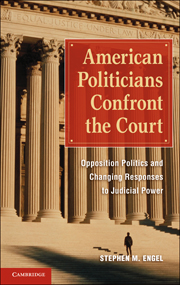 American Politicians Confront the Court
American Politicians Confront the Court Published online by Cambridge University Press: 05 June 2012
This chapter lays out a theory of elected branch-judiciary relations, which anchors individual interests and strategies in perceptions, ideas, and norms. It offers an explanation of the observed shift, detailed in Chapter 1, in emphasis of attacks on judicial authority, that is, a move from undermining judicial legitimacy to harnessing judicial power, which, in its general outlines, pivots the years of Civil War and Reconstruction.
Strategic-interest models offer one possible explanation for the harnessing strategy: deference to judicial authority may serve political purposes. Yet, many of these theories tend to take preferences as given – even if they are institutionally constrained – and hold the underlying parameters of rationality constant; the ideas and norms constituting the boundaries of rationality and structuring the range of legitimate political choices are not themselves closely scrutinized. In short, they “relegate ideas, however they are conceived, to the sidelines in explanatory accounts of political processes.” As such, ideas are often viewed as derivative of or epiphenomenal to interests rather than constituting them.
However, entrenched ideas, like norms and institutions, limit and motivate political action. Entrenched ideas constrain how challenges to a political regime can take shape: “challengers to a dominant regime do not operate in an empty playing field, but are forced to challenge inherited norms and institutions, or to adapt their insurgency to the regime they seek to dislodge.” Political agents are situated in an inherited regime of ideas and institutions that set the boundaries and delimit the range of legitimate preferences.
To save this book to your Kindle, first ensure no-reply@cambridge.org is added to your Approved Personal Document E-mail List under your Personal Document Settings on the Manage Your Content and Devices page of your Amazon account. Then enter the ‘name’ part of your Kindle email address below. Find out more about saving to your Kindle.
Note you can select to save to either the @free.kindle.com or @kindle.com variations. ‘@free.kindle.com’ emails are free but can only be saved to your device when it is connected to wi-fi. ‘@kindle.com’ emails can be delivered even when you are not connected to wi-fi, but note that service fees apply.
Find out more about the Kindle Personal Document Service.
To save content items to your account, please confirm that you agree to abide by our usage policies. If this is the first time you use this feature, you will be asked to authorise Cambridge Core to connect with your account. Find out more about saving content to Dropbox.
To save content items to your account, please confirm that you agree to abide by our usage policies. If this is the first time you use this feature, you will be asked to authorise Cambridge Core to connect with your account. Find out more about saving content to Google Drive.